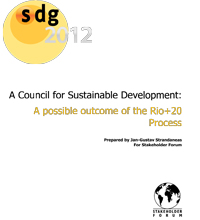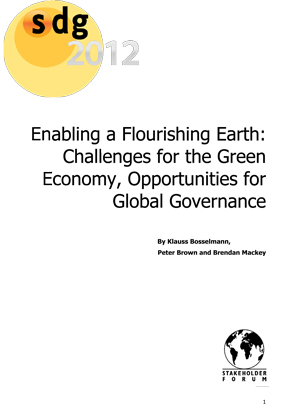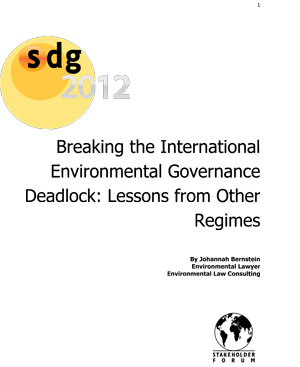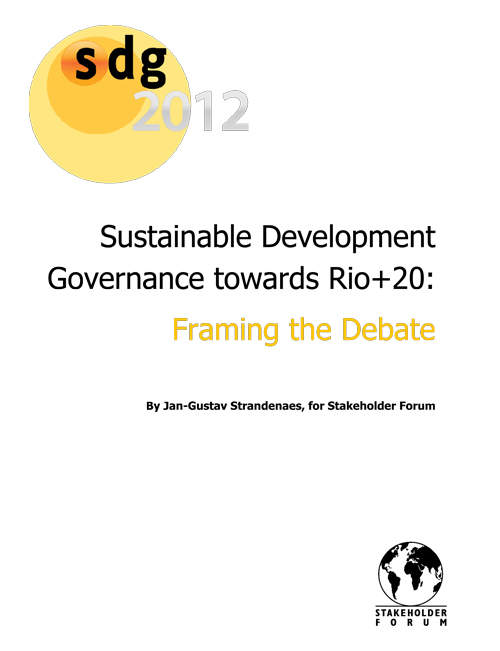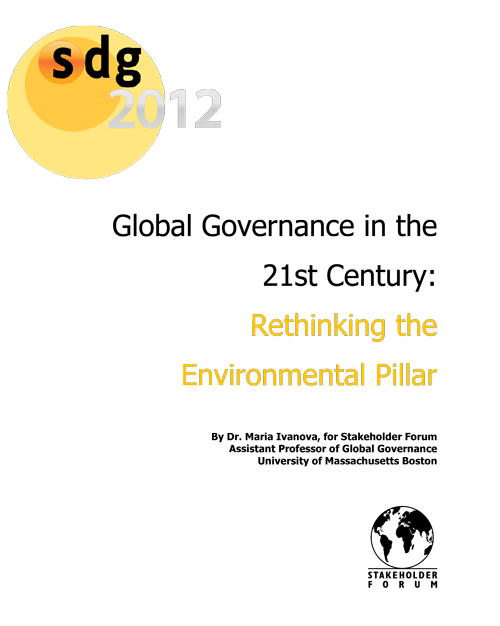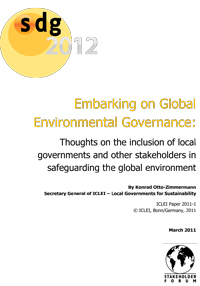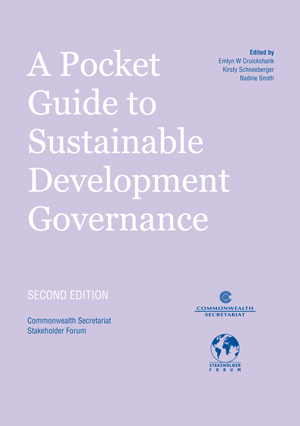SDG2012: Think Pieces
New: Sustainable Development Councils at National and Sub-National Levels Stimulating Informed Debate:
Stocktaking
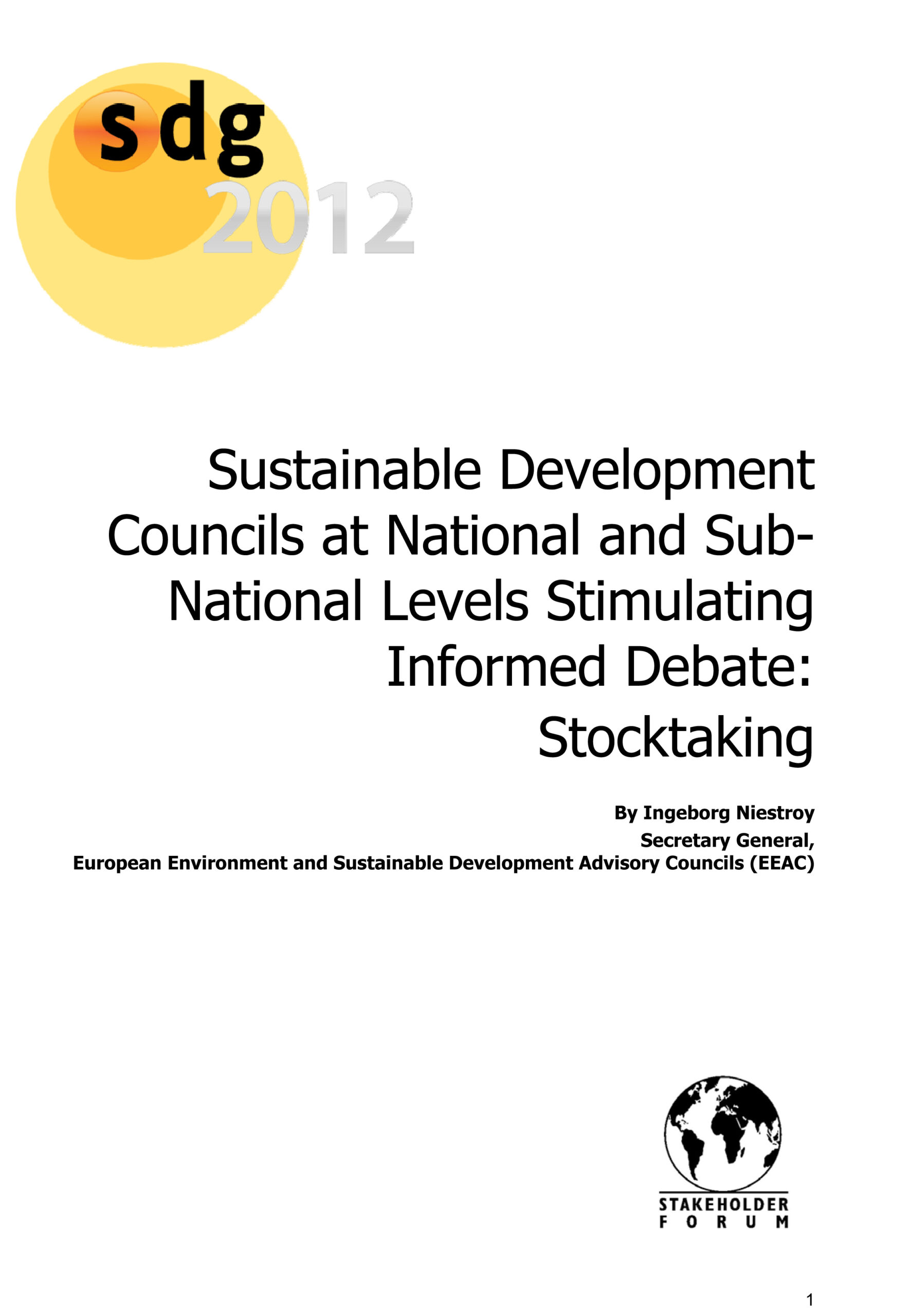
By Ingeborg Niestroy,Secretary General, European Environment and Sustainable Development Advisory Councils (EEAC)
The article captures the diffusion of Sustainable Development Councils (SDCs), providing analysis of different models regarding tasks and function, as well as good practice examples and some insights on failures and challenges. As there is little data available for the global picture, the article focuses on Europe, where it is based on surveys and other studies.
SCP Governance, Sustainable Consumption and Production Governance: A Guide towards Rio+ 20
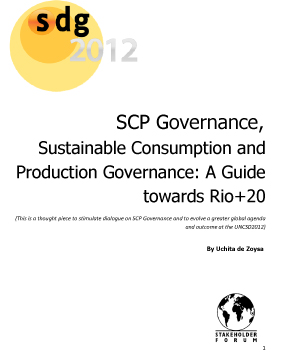
By Uchita de Zoysa
SCP is assumed to become a discussion topic under a green economy in the context of sustainable development and poverty eradication. This is to frame the conceptual framework of SCP. But if the SCP dialogue is to provide a tangible outcome of UNCSD 2012, it should be positioned as a governance discussion. Therefore, SCP Governance needs to now emerge in the UNCSD 2012 agenda and the discussions should be framed under the institutional framework for sustainable development.
A Preliminary Examination of the Possibilities for the Institutional Representation of the Interest of Future Generations and Environmental Protection within the System of the United Nations
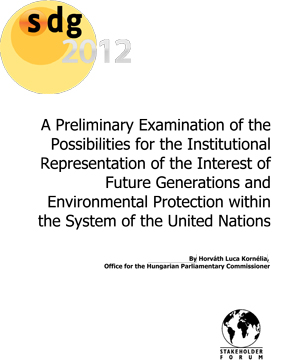
By Horváth Luca Kornélia, Office for the Hungarian Parliamentary Commissioner
This study examines the possible ways of establishing a new United Nations (UN) Office of the High Commissioner for Future Generations/Environment. At the same time we keep in mind the task of increasing the effectiveness of the UN’s environmental functions by rationalising the competences of present bodies.
Lessons from GATT/WTO for enhancing UNEP
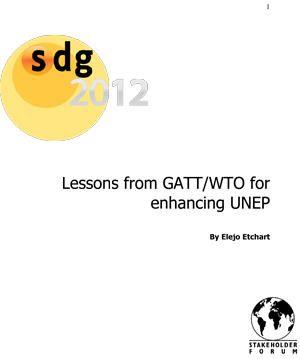
By Alejo Etchart, Environmental Consultant and Advisor to Stakeholder Forum
This document analyses some implications of the GATT/WTO regime, as well as of the process of transformation from GATT to WTO, for the environmental governance and for an eventual upgrade of the UNEP. It particularly addresses some questions to help Stakeholder Forum (SF) take a position on the validity of GATT/WTO model as a reference for that eventual upgrade, possibly in the form of a World Environment Organization (WEO).
Sustainable Development Governance and a Sustainable Development Board
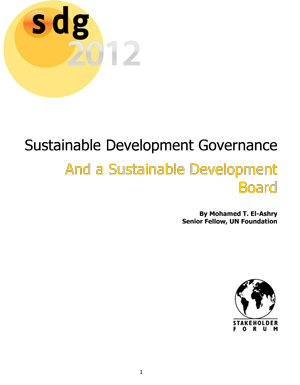
By Mohammed T. El Ashry – Senior Fellow, UN Foundation
This paper examines how despite all the highpowered gatherings, agreements and commitments, little progress has been achieved in improving the environment and in pursuing sustainable development.
Ombudspersons for Future Generations as Sustainability Implementation Units
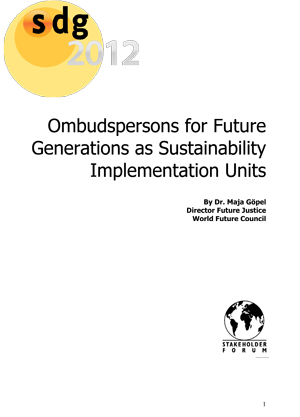
By Dr. Maja Göpel, Director Future Justice, World Future Council
Sustainable development enjoys widespread recognition as a policy goal which, if implemented, is capable of providing “healthy and fulfilling lives for the current generation,while entrusting to future generations the means to do the same” (UNCED definition of 1992). Progress has been made in this regard since the UN Conference on Environment and Development in Rio de Janeiro in June 1992 – for example, on sustainable development metrics. Yet, despite several international processes and agreements over the last 20 years,long-identified unsustainable trends continue.
A Council for Sustainable Development: A possible outcome of the Rio+20 Process
By Jan-Gustav Strandaneas, Stakeholder Forum
Establishing a new United Nations Council on Sustainable Development would be a momentous decision, and one that would signal to the world the critical urgency and the high priority given to the issue of sustainable development. A series of environmental urgencies, increasing disparities and lack of global social equity, absence of equitable financial development, failures of the three pillars of sustainable development all substantially documented, have created a situation in which it has become a political necessity to act simply to save the future of the world
Enabling a Flourishing Earth: Challenges for the Green Economy, Opportunities for Global Governance
By Klauss Bosselmann, Peter Brown and Brendan Mackey
In response to the agenda for Rio+20, we address here a major problem in sustainable development that brings together the issues of a green economy and institutional arrangements: how can we make more secure, abundant and widely shared those classes of public goods that are central to sustainable development but which cannot be satisfactorily addressed through market-based macroeconomic policy instruments? In addressing this question, we take as a presupposition that the international community’s search for more sustainable ways of living is to be guided by ethical principles as articulated in international hard and soft law, along with civil society declarations
Breaking the International Environmental Governance Deadlock: Lessons from Other Regimes
By Johannah Bernstein, International Environmental Lawyer
International environmental governance (IEG) has been the subject of reform for the past two decades. Efforts have taken the form of high-level advisory groups, independent commissions, task forces, UN General Assembly consultations and ministerial consultative groups. This paper looks at the need for a new paradigm for environmental governance that is firmly rooted in a global good ethos, which not only recognizes the interconnected nature of worsening global challenges, but which also emphasises the importance of authority and resources to compel collective action in the face of narrow national interests.
Sustainable Development Governance towards Rio+20: Framing the Debate
By Jan-Gustav Strandeneas, for Stakeholder Forum
This paper outlines the history of global governance for sustainable development, charting some of the significant milestones and also identifying the challenges to progress and reform. It outlines some recommendations for taking forward sustainable development in the UN system, and stresses the need for immediate and ambitious reform.
Global Governance in the 21st Century: Rethinking the Environmental Pillar
By Dr Maria Ivanova, University of Massachusets
This paper addresses the need for reform of the environmental pillar of sustainable development at the global level, and responds to the recent developments from the UNEP Consultative Group of Ministers and High Level Representatives on IEG reform. Dr Ivanova outlines the contours of the current IEG reform debate, and juxtaposes them with some of the underlying challenges in addressing environmental issues globally. Whilst reform options represent a significant step in the right direction, more fundamental reform is needed to advance environmental objectives globally.
Greening the International Financial Institutions (IFIs): Finance for the next decade’s sustainable development

By Kirk Herbertson, World Resources Institute
This paper outlines the need for reform of the International Financial Institutions (IFIs) as part of a broader package of sustainable development governance reforms. It argues that the decision-making of IFIs is sometimes at odds with the objectives of the UN – operating within the language of finance and development, rather than environment and human rights. As the World Bank and other IFIs begin to play an increasingly important role in financing sustainable development, they will need to find ways to better collaborate with UN agencies. Rio2012 must advance a dialogue on how to reconcile the Bank’s focus on economic growth with UN imperatives of environmental and human rights.
Environmental Institutions for the 21st Century – An International Environmental Court
This paper makes the case for the establishment of an International Court for the Environment (ICE). It argues that a Court is necessary for two main reasons – firstly to play a role in enforcing international environmental law as enshrined in Multilateral Environmental Agreements (MEAs). Secondly to create a global legal institution that would be equipped to hear technical scientific evidence that is common to environmental cases, and to deliver justice for non-State actors.
It is envisaged that the ICE would become the principal court dealing with international environmental law, helping to clarify existing treaties and other international environmental obligations for states and for all other parties including trans-national corporations. It would do this through dispute resolution, advisory opinions, and the adjudication of contentious issues presently unclear or unresolved.
Enhancing Science-Policy Links for Global Sustainability

By Peter Bates PhD and Gisbert Glaser PhD
Efforts to improve the institutional framework for sustainable development at all levels, and international environmental governance institutions, must include strengthening of science-policy links, as existing and new institutions require access to the best scientific knowledge available. This includes knowledge in the social and economic sciences, as well as interaction with research communities worldwide. This also requires criteria for good ‘science for policy’, including scientific quality and credibility; policy relevance and coherence, and legitimacy in a political context.
Reforming Global Environmental Governance: The Case for a United Nations Environment Organisation,
This paper makes the case for the establishment of a World Environment Organisation. It traces the development of the debate for a WEO over the past 40 years, and outlines the different models that have been proposed. Biermann argues that the transformation of UNEP into a Specialized Agency – either a World Environment Organisation or a UN Environment Organisation – would follow a long-standing policy of functional specialisation within the UN system and would significantly enhance the authority of UNEP. Such a set-up would allow the negotiation of environmental Treaties within ‘sub-committees’ of the UNEO General Assembly, which would then be adopted by the membership, thus moving away from the current fragmented system of Multilateral Environmental Agreements. It could also significantly enhance efficiency through the development of common reporting frameworks across multiple environmental regimes, thereby reducing the reporting burden on developing countries. The development of a WEO is presented not as a ‘silver bullet’ but as an important building block for the enhanced effectiveness of earth system governance.
By Frans Verhagen
This think-piece proposes that the present unjust, unsustainable, and, therefore, unstable international monetary system, which presently functions without a standard, be transformed into one that has carbon-based standard. Such a carbon-based monetary system, the most important pillar of the Tierra Fee & Dividend (TFD) global governance system, put forward in this proposal, would replace the present one, characterized by financial imbalances, volatile exchange rates, currency disputes, currency manipulation and speculation and, last but not least, a global reserve system that costs non-hard currency nations billions of dollars annually. Additionally, such a transformation would contribute to solving the challenges posed by the climate crisis, sustainable development and a dysfunctional monetary system simultaneously in that it would also provide the basis for an integrated global governance system. Thus the TFD addresses itself to the two main objectives of the Rio 2012 Earth Summit process, i.e. promotion of a green economy as part of sustainable development and the establishment of a global governance system. Moreover, as noted above, it also addresses the climate crisis, an area of concern that is not included in the present planning process though it is widely acknowledged to heavily impact economies—green or otherwise—and all programs of sustainable development.
A Brief Thought Piece: An evolutionary perspective on Sustainable Development Governance
This paper makes the case that the traditional model of environmental governance is one dominated by regulatory control at the level of the nation state. The increasingly complex nature and global breadth of today’s environmental challenges, however, exposes logical limits of that traditional model. The frontier of engagement with these challenges must be both broadened and deepened well beyond the capacity of that traditional governmental focus. What will be needed, ironically, is to re-frame the roles and expectations of industry and the larger civil society within environmental governance – to effectively harness their extra-national character and capabilities and to enlist and lead them in driving toward sustainability across the broad range of societal actors globally.
Such a transition is already evolving, but will take vision and leadership at this crucial time to leverage and extend it. A preemptory focus on traditional government regulatory control will fail to harness these hugely important forces and in so doing will effectively stifle necessary efforts to extend environmental protection and sustainability deeper into the technical, economic and consumer decision-making that is shaping our future around the Globe.
Embarking on Global Governance: Thoughts on the inclusion of local
By Konrad Otto-Zimmermann
This paper argues that the conceptualisation of international environmental governance must be broadened. Currently discussions all-too-often revolve around reform of the UN system, which does not encompass a broader perspective on how best to govern the global commons. The role of cities and local government is crucial in the broader conceptualisation of governance. By 2050 cities may account for 90% of the global economy – to address the challenge that this will pose, local governments will need to take leadership in implementing innovative initiatives to reduce environmental impact. This kind of action is exemplified by the launch of the Cities for Climate Protection campaign for voluntary CO2 emission reductions in the aftermath of the Rio Earth Summit in 1992. Building on this, the paper argues for ‘responsive evolution’ in global governance, developing multi-stakeholder and multi-layered governance to make global institutional arrangements more responsive to tomorrow’s needs.
Moving from Principles to Rights
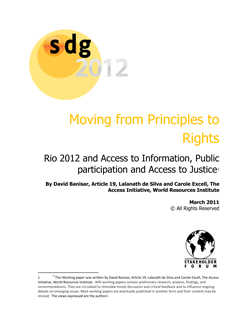
By David Banisar, Article 19, Lalanath de Silva and Carole Excell, The
Access Initiative, World Resources Institute
In the 1992 Rio Declaration on Environment and Development, the international community recognized that sustainable development depends upon good governance. Principle 10 of the Declaration sets out the necessary elements for sound environmental governance – the rights of access to information, public participation, and access to justice. The three “access rights” facilitate more transparent, inclusive and accountable decision-making in matters affecting the environment and development.
This paper argues that governments that have not already done so must establish legal rights to access to information, public participation and justice and all governments must demonstrate that they are implementing these rights. This paper argues that the Rio+20 outcome should include an affirmation of these rights, including a commitment to the development of new global and regional treaties.
